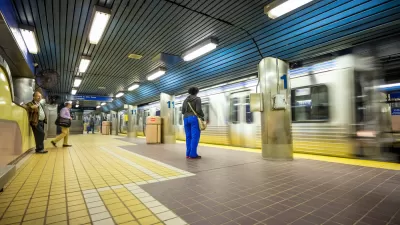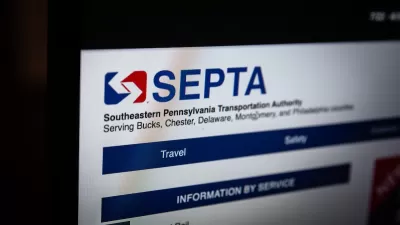With Pennsylvania a battleground state and Philadelphia a Democratic stronghold, ensuring that transit-dependent voters get to the polls was a given, but a transit strike beginning Nov. 1 threatened to derail access. The strike was settled Monday.

"A strike that paralyzed public transportation in Philadelphia for a week ended Monday when the Southeastern Pennsylvania Transportation Authority (SEPTA) and a union representing almost 5,000 employees announced a deal on the eve of Election Day," reports John Bacon with USA TODAY.
The deal was struck hours after the transit agency announced it was seeking a court injunction to force its employees back to work. SEPTA said any disruption of public transit would inhibit city residents from voting in Tuesday's elections.
A SEPTA press release states that phased service was implemented on Monday, with "full service to be restored by start of service on Tuesday." It indicates that SEPTA and TWU Local 234 agreed to "a tentative five-year contract."
The tentative contract agreement will now go before TWU Local 234 members for a ratification vote, and to the SEPTA Board for approval.
Bacon adds, "Any issue that might disrupt voter turnout Tuesday would be problematic for Mayor Jim Kenney and other Democratic leaders of this overwhelmingly Democratic city that is expected to provide big numbers for Hillary Clinton's presidential bid.
SEPTA's bus, subway, and trolley services provide about 900,000 rides on weekdays. The Regional Rail services did not strike, but they were reportedly overwhelmed with riders displaced by the transit strike.
In addition to the mayor's press release on the resolution of the transit strike, he also issued two transportation-related press releases on Nov. 7 that will make it safer for those who bike or walk to polling places on future election days.
- He signed "an Executive Order that formally creates the Office of Complete Streets and a Vision Zero Task Force, a major step toward the goal of making Philadelphia streets safer for all users.
- He recognized the indispensable role that "Indego, Philadelphia’s public bike share transportation system, played in keeping Philadelphia moving during the SEPTA service interruption this past week."
-
Indego daily ridership doubled during that period, with a total of more than 24,000 trips. Ridership averaged more than 3600 trips, with a peak of 4300 trips last Friday. This marked an increase over the average weekday ridership of 2,400 trips per day since our spring expansion.
Related on Planetizen:
- Could the Philadelphia Transit Strike Determine Who Becomes the Next President?, November 3, 2016
- Indego Bikeshare in Philadelphia Building on Early Success, August 10, 2015
FULL STORY: An early win for Clinton: Transit strike ends in Philly

Alabama: Trump Terminates Settlements for Black Communities Harmed By Raw Sewage
Trump deemed the landmark civil rights agreement “illegal DEI and environmental justice policy.”

Planetizen Federal Action Tracker
A weekly monitor of how Trump’s orders and actions are impacting planners and planning in America.

How Atlanta Built 7,000 Housing Units in 3 Years
The city’s comprehensive, neighborhood-focused housing strategy focuses on identifying properties and land that can be repurposed for housing and encouraging development in underserved neighborhoods.

In Both Crashes and Crime, Public Transportation is Far Safer than Driving
Contrary to popular assumptions, public transportation has far lower crash and crime rates than automobile travel. For safer communities, improve and encourage transit travel.

Report: Zoning Reforms Should Complement Nashville’s Ambitious Transit Plan
Without reform, restrictive zoning codes will limit the impact of the city’s planned transit expansion and could exclude some of the residents who depend on transit the most.

Judge Orders Release of Frozen IRA, IIJA Funding
The decision is a victory for environmental groups who charged that freezing funds for critical infrastructure and disaster response programs caused “real and irreparable harm” to communities.
Urban Design for Planners 1: Software Tools
This six-course series explores essential urban design concepts using open source software and equips planners with the tools they need to participate fully in the urban design process.
Planning for Universal Design
Learn the tools for implementing Universal Design in planning regulations.
Jessamine County Fiscal Court
Caltrans
Institute for Housing and Urban Development Studies (IHS)
City of Grandview
Harvard GSD Executive Education
Toledo-Lucas County Plan Commissions
Salt Lake City
NYU Wagner Graduate School of Public Service




























